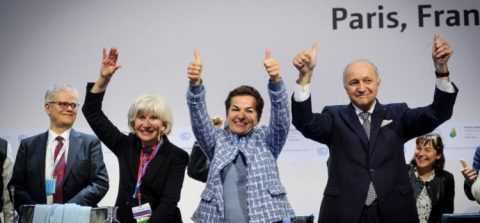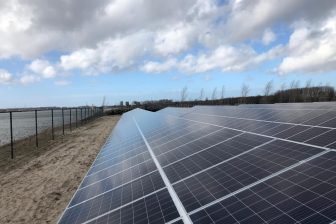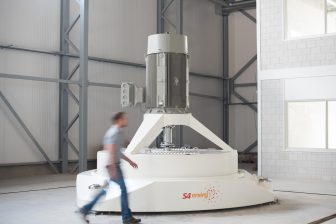
‘Wetenschap moet zich aanpassen na Klimaatakkoord’
7 juli 2016 – Na het sluiten van het Klimaatakkoord in Parijs, moet de wetenschap opnieuw zijn richting bepalen, stelt een groep Franse wetenschappers. Zij komen in PNAS online met nieuwe onderzoeksrichtingen.
De ‘interdisciplinaire groep wetenschappers’ (alle Frans) die het opiniestuk in PNAS online schreven, waren tijdens de klimaatonderhandelingen verantwoordelijk voor het geven van academische inzichten aan de voorzitters en aan het Franse onderhandelingsteam. Nu het Klimaatakkoord er is, moeten de wetenschappers de richting van hun onderzoek opnieuw bepalen, aldus de wetenschappers.
Uit het artikel in PNAS online
‘(…) Here we analyze research gaps and identify new directions of research in relation to a number of facets of the Paris Agreement, including the new 1.5 °C objective, the articulation between near-term and long-term mitigation pathways, negative emissions, verification, climate finance, non-Parties stakeholders, and adaptation. (…)’
Het 1.5 °C doel kan volgens de auteurs de wetenschap verdelen: aan de ene kant is een scenario met een grotere opwarming realistischer, maar aan de andere kant zijn er ethische redenen om het doel wel op 1.5 graden te stellen, schrijven de onderzoekers.
‘(…) the 1.5 °C objective offers contradictory perspectives that may be difficult to reconcile, and hence may divide the scientific community. Diverging short-term interests among signatory countries, socio-economic barriers to changes, and technological lock-ins in energy systems question the feasibility of such a goal. Furthermore, this 1.5 °C objective may distract the community from focusing research efforts on the risks and impacts of more severe warming scenarios between 2 °C and 4 °C. These scenarios are more likely to happen than the 1.5 °C, and require adaptation measures planned well in advance. Focusing on a 1.5 °C scenario also constitutes, some argue, a form of hypocrisy, sustaining false hope from the public and most vulnerable countries.
Although achieving a 1.5 °C objective may appear as a lost cause, it can nevertheless be seen as a necessary baseline for climate negotiations. There is also an ethical issue in play: it is certainly too early in climate negotiations to accept the destruction of low-lying islands and other regions that may not be capable of adapting to warmer conditions. Finally, we must acknowledge that technological progress, together with efforts from all stakeholders and widespread changes to individual behaviors, could bring enough mitigation to effectively bridge the gap to the 2 °C—if not the new 1.5 °C—objective. (…)’
Naast het 1.5 °C doel, doen de auteurs ook suggesties voor andere onderzoeksrichtingen.
‘(…) In conclusion, the Paris Agreement not only calls for further disciplinary research but also for an increased capacity of the scientific community for interdisciplinary work on multiple scales. The need to better estimate the magnitude of the climate response to greenhouse gases, and its regional aspects in relation to adaptation strategies, cannot be overstated. Research in social and economic sciences rely on three paradigms: the use of Integrated Assessment Models, the development of national de-carbonization scenarios, and the production of sectoral or community level “innovation-for-transition” studies that are applied jointly to climate governance at international, regional, national, and subnational levels. Finally, the need for transparency and verification will require research to improve regulatory design. (…)’
Bron
PNAS online, 5 juli 2016: Opinion: In the wake of Paris Agreement, scientists must embrace new directions for climate change research



